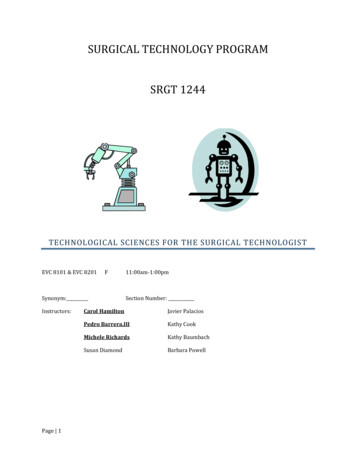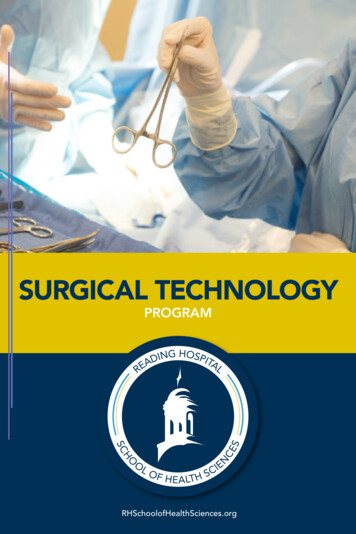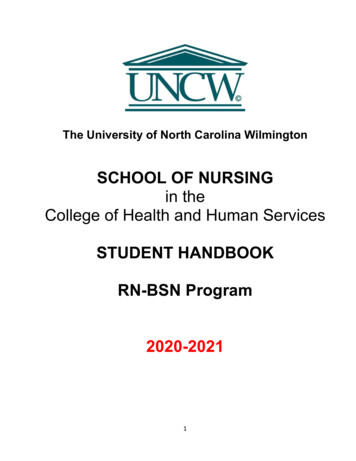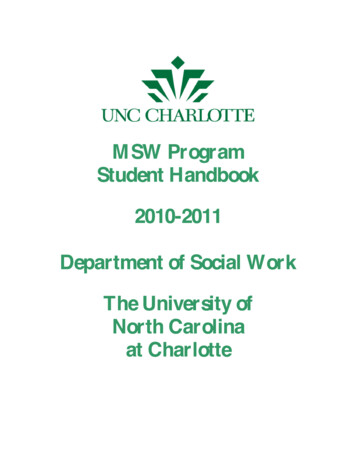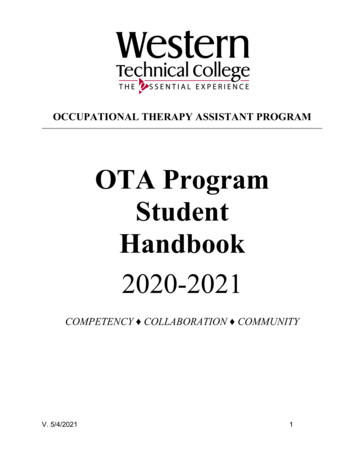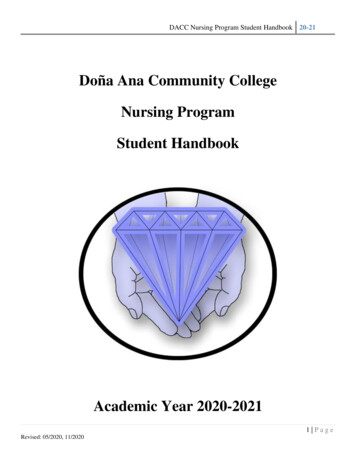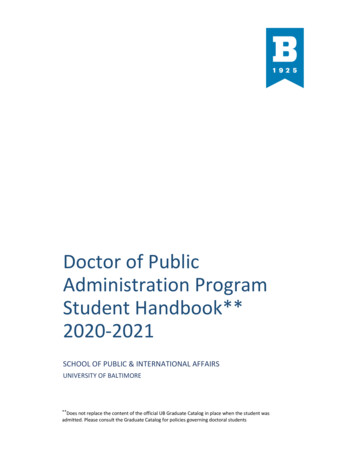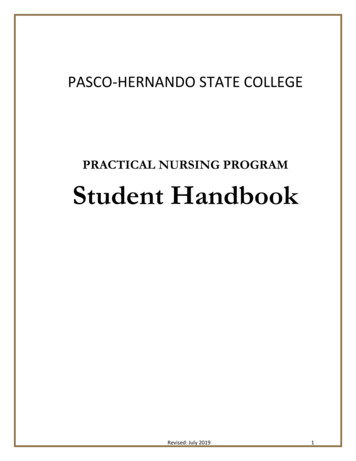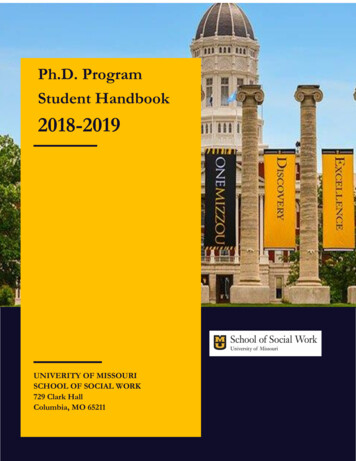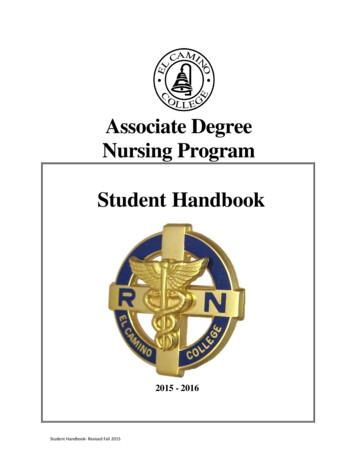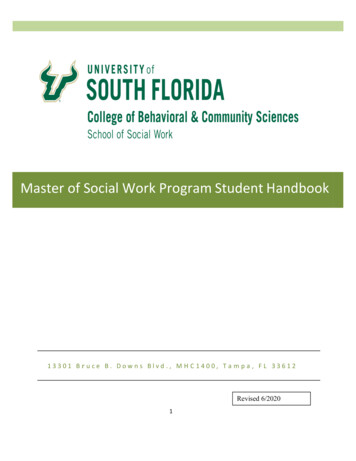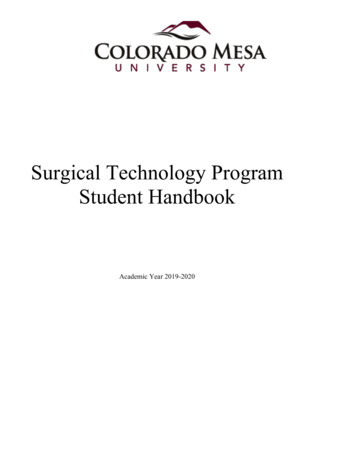
Transcription
Surgical Technology ProgramStudent HandbookAcademic Year 2019-2020
Surgical Technology OverviewSurgical technologists are allied health professionals who are integral parts of the medical teamproviding surgical care to patients in a variety of settings. The surgical technologist works undermedical supervision to facilitate the safe and effective conduct of invasive surgical procedures.This individual works under the supervision of a surgeon to ensure that the operating room orenvironment is safe, that equipment functions properly, and that the operative procedure isconducted under conditions that maximize patient safety. A surgical technologist possessesexpertise in the theory and application of sterile and aseptic technique. By combining knowledgeof human anatomy, surgical procedures and surgical instrumentation, surgical technologistsfacilitate surgeons’ performance of invasive therapeutic and diagnostic procedures.Surgical Technology (SUTE) ProgramThe Surgical Technology (SUTE) program at Colorado Mesa University (CMU) is fivesemesters in length. University-required Essential Learning and pre-requisite courses arecompleted during the first two semesters and first summer session. Students begin SUTE coursesin the fall of their third semester and continue SUTE courses for the duration of the program.Upon completion of SUTE courses, students spend a summer session in applied experiences ataffiliated hospital surgery areas located in western Colorado. Students must participate insurgical cases (observation cases, first and second scrubbing). In order to obtain the Associate ofApplied Science (AAS) degree, students must complete all required coursework with a minimumgrade of C, maintain a cumulative GPA of 2.0 in all CMU coursework, and complete a minimumof 120 surgical cases. Upon program completion, students are eligible to take the National Boardfor Surgical Technology and Surgical Assisting (NBSTSA) certification exam. The majority ofSUTE courses are delivered in a lecture and lab setting. Resource material is delivered onlinewhile lab sessions are held at St. Mary’s Surgical Lab (located on the second floor) in GrandJunction, CO. Meetings on the CMU campus may be required at times. Students take the SUTEcourses in the specified order as course progressions build upon knowledge obtained in earliercoursework. Part-time coursework is not allowed.Program Philosophy. SUTE encompasses practice in a broad number of settings and requirespreparation in a number of subjects and practice areas. The objective of this program is toprovide students with the background and tools necessary to successfully navigate the nationalcredentialing process and secure entry-level employment in a variety of surgical workenvironments. Equally important is the transition from student to professional and the beginningof a lifetime of learning. Our role as educators is to mentor, guide, and provide an environmentin which learning can take place. The learning styles of students vary, so material is presented invarious formats. Learning is an active process on the part of the student. The transition fromstudent to professional is neither easy nor fast and will not occur without commitment on the partof the student, no matter how skilled or dedicated the teaching staff. In order to reach the entrylevel competencies, motivation on the part of the student is essential. Much of this program isbased on class participation, building on fundamental cases and progressing in skill level.Concentrate on building critical thinking skills as much as mastery of facts and processes. Thereis no way that in the short time allotted that all of the entry-level competencies can be covered.You will become responsible for your own education.Program Mission. The mission of the SUTE program include the following:1. To provide students with a body of knowledge and clinical training to develop entrylevel competencies in all routine areas of the Surgical Technology area.2. To produce graduates who demonstrate ethical behavior and professional attitudes.
3. To provide a quality program, with ongoing assessment, evaluation and revision.4. To fill a community need for well-trained certified surgical technologies to staff surgicalsuites.5. To provide accessible, affordable education and training for residents of westernColorado who are seeking employment in the expanding health care industry.6. To promote membership and active participation in professional societies.Goals for Standards of Practice of Surgical Technologists. Goals established by theAssociation of Surgical Technologists (AST) in relation to SUTE Standards of Practice include:1. Providing guidance to surgical technologist practitioners, students, educators, and thehealthcare environment.2. Promoting and contributing to the enhancement of quality care for the surgical patient.3. Informing the public of the standards of care they are entitled to receive from the surgicaltechnologist.Institutional Student Learning Outcomes. Students graduating with an Associate of AppliedScience (AAS) degree from CMU should be able to:1. Locate, gather, and organize evidence on an assigned topic addressing a course ordiscipline-related question of practice in a work or community setting (AppliedLearning/Specialized Knowledge).2. Use program-level mathematical concepts and methods to understand, analyze, andexplain issues in quantitative terms (Quantitative Fluency).3. Make and defend claims in a well-organized, professional document and/or oralpresentation that is appropriate for a specific audience (Communication Fluency).4. Identify and gather the information/data relevant to the essential question, issue and/orproblem and develop informed conclusions (Critical Thinking).5. Reflect on and respond to ethical, social, civic, and/or environmental challenges at local,national, and/or global levels (Personal and Social Responsibility).6. Identify, utilize and cite various sources of information in academic assignments, projectsor performances (Information Literacy).Program Student Learning Outcomes. Students graduating with an AAS degree in SurgicalTechnology should be able to:1. Define and demonstrate the scope and breadth of surgical technology and related skillsusing evidence-based resources.2. Identify and calculate therapeutic interventions for selected patient populations.3. Summarize discipline-specific case presentations to professionals and peers.4. Interpret administrative and clinical policies to advocate for patient safety during surgicalprocedures.5. Translate discipline-specific concepts into clinical surgical practice.Student learning outcomes for each SUTE course are included in course syllabi.Standards and Guidelines. The Commission on Accreditation of Allied Health EducationPrograms (CAAHEP), Accreditation Review Council on Education in Surgical Technology andSurgical Assisting (ARC/STSA), the American College of Surgeons (ACS), and the Associationof Surgical Technologists (AST) establish, maintain and promote standards of quality foreducational programs in SUTE. These accreditation agencies also provide recognition foreducational programs that meet or exceed the minimum standards outlined in the AccreditationStandards and Guidelines.Program Accreditation. The SUTE Program is accredited by:
The Accreditation Review Council on Education in Surgical Technology and SurgicalAssisting (ARCST/SA), 6 West Dry Creek Circle, Suite 110, Littleton, CO 80120. The Commission on Accreditation of Allied Health Education Programs.National Testing. The National Board of Surgical Technology and Surgical Assisting(NBSTSA) retains the sole authority to establish eligibility requirements and to make all finaldecisions regarding eligibility. Before testing, individuals must first establish eligibility bysubmitting the appropriate examination application form along with the correct fees. NBSTSAdoes not refund processing fees for ineligible candidates. Once approved, NBSTSA providescandidates with an Authorization to Test number (ATT), and both the phone number and webaddress to contact the testing agency to schedule the test. NBSTSA accepts all properlycompleted applications from qualified applicants regardless of the applicant’s age, sex, race,religion, marital status, disability or national origin.Professional Societies and Certifying Agency uidelines Best Practices/SUTE FacultyMegan Dunegan AAS, CST: Program Director and Instructor, mdunegan@coloradomesa.eduLorrie Ettenburn CST-SFA: Instructor, Letenburn@coloradomesa.eduProgram Cost Estimates. Tuition and university-related fees can be found penses.html. Additional estimated SUTEprogram fees include:Additional Estimated Surgical Technology Program Fees*SUTE courses Tuition & Student feesSUTE Lab FeesMiscellaneousBackground CheckLiability insurance (annually)Drug ScreenTEAS V Exam (at time of application)Parking passHealth & ImmunizationsVaricella (Chicken Pox) Immunization (if needed, or titer)Hepatitis B Immunizations ( 60 x 3)Tetanus immunization (if needed)TST (TB Skin Test/PPD) Testing (annually)Influenza vaccineMMR (proof of two vaccinations or titers)Personal Health InsuranceImmutrax Immunization TrackerPhysical ExaminationBooks-CMU BookstoreSurgical Technology Program BooksLab materialsUniforms-used in theory & applied e800.00100.00
Uniforms ( 45 x 2 recommended)90.00IncidentalsSurgical Technology patch (each)4.00Office Suppliesvariable* This list is an estimate to assist students in budgeting. The costs are approximate and aresubject to change without notice.
Application and Program AdmissionApplicationStudents may apply to the SUTE program in the spring semester, provided they have completed(or are completing) prerequisite coursework. The application deadline is May 1. Students mayvisit the SUTE website, located at s/surgical-technology.html, for frequently asked questions, accreditation status,program requirements, Test of Essential Academic Skills V for Allied Health (TEAS V) exams,and the program application. Applicants who meet the minimum requirements are interviewed inperson by program faculty.Admission RequirementsStudents accepted into the SUTE program are required to comply with all regulatory, health, andsafety requirements. All requirements must be met for the entirety of the program. Students arerequired to renew requirements that expire annually (e.g. annual flu shot) prior to the appliedexperience. Minimum requirements are outlined below.Physical examination. All students must have a physical examination performed by ahealthcare provider. At the time of the examination, the student should ask the provider tocomplete and sign the Essential Requirements for Surgical Technology list. Once completedand signed by the provider, this document should be given to the Department of HealthSciences (DHS) administrative assistant to be kept in as part of the student’s record.Immunizations. Students are required to have proof of immunization or immunity of thefollowing: Measles/ Mumps/ Rubella, Varicella, Tetanus, Hepatitis B, influenza. Students arealso required to have a current TB skin test.Personal health insurance. Student must submit proof of personal health insurance. Studentsmust obtain this at their own expense and maintain it for the duration that the student is in theprogram. Students must submit proof of personal health insurance prior to enrollment. TheSUTE program clinical sites are only those sites in which a contract is in place that stipulates thatemergency care will be provided if the student is injured on site. Students are responsible for allhealth care expenses incurred if exposed or injured on site, unless that site is covered by CMUWorker’s Compensation. Students are not required to be tested for HIV or disclose their HIVstatus. However, if a patient, instructor, or student is exposed to another student’s blood throughan accidental needle stick, that student has a moral obligation to be tested at their expense. If theresults are positive, the exposed person will be notified of the results. If a significant exposureoccurs, CDC guidelines will be followed at the student’s expense. The student should see his/herown physician for follow-up treatment and testing if necessary.Professional liability insurance. Students are required to maintain professional liabilityinsurance as a surgical technology student. The policy must be comprehensive general liabilityinsurance covering bodily injury and property damage liability with minimum coverage limits of 1,000,000 per occurrence / 2,000,000 general total limit, and medical professional liabilityinsurance with minimum coverage limits of 1,000,000 per claim / 3,000,000 annual aggregate.Students must obtain this at their own expense and maintain for the period of enrollment in theprogram.Drug Screen. A mandatory drug screen is required upon admission.
Criminal Background Investigation. Potential students who have been provisionally acceptedinto the SUTE program will undergo a criminal background investigation. CMU has partneredwith CastleBranch to provide these background checks. The criminal background investigationwill include a record of all convictions. A “conviction” is a verdict, guilty plea or NoloContendere (“No contest”) plea. Health science programs may conduct follow up backgroundinvestigations at selected intervals to comply with clinical placement requirements. Clinical sitesmay request a copy as part of Joint Commission accreditation procedures. Upon notification for need for background investigation, the incoming SUTE studentwill access the CastleBranch website (https://www.castlebranch.com/). Applicants whorefuse to complete this section or who do not answer truthfully and fully will not beallowed to enter the SUTE program. Individuals must complete the application online, including paying the associated feesdirectly to CastleBranch. CastleBranch will update the status of the background check report via their website.Administrative assistants and the Department Head have login access to theadministrative site to review and process the background check. The applicant mayreview the criminal background investigation information completed by using theirCastleBranch login and password created when the background check was ordered. A flagged background check will be reviewed initially by the Department Head.Additional information related to the offenses may be requested from the applicantfor consideration by the Department Head and Background Check Committee. Ifthe applicant feels that there are extenuating circumstances to be considered, he/shemay submit a written request to the Department Head. Additional information must be submitted to the Department Head within 10 businessdays. The Background Check Committee will review all criminal backgroundinvestigation results and additional information submitted by the student within 7business days. The committee will be responsible for making the final decisionregarding whether results will disqualify an applicant from admission. TheBackground Check Committee may make exceptions where it is deemed to be in thebest interests of the CMU Department of Health Sciences. The applicant will benotified in writing of the Background Check Committee decision. The applicant has the right to appeal the decision of the Department Head and/orBackground Check Committee to the Vice President for Student Services within 10days. The decision of the Vice President for Student Services is final. Students are responsible for self-reporting offenses that occur after admission to ahealth sciences program to the Department Head. The Department Head will reviewoffenses with the respective Program Coordinator and Background Check Committeeto determine whether the student can continue in the program. Failure to self-reportan offense may lead to immediate removal from the program.Email. Upon admission, students are provided with a CMU email address. Students should usethis email address for all program communication, including course enrollment, courseassignments, and any other program- or course-related information. Email is the preferredmethod of communication with program faculty. Students are required to activate their CMUemail account by going to the Tomlinson Library computer room (if not already activated). Thisaccount is free for CMU students. It is the student’s responsibility to check his/her email on aroutine basis.Nametag. All students must wear name tags when in the clinical setting. Name Tags should listthe student’s name, institution, and student’s status as a SUTE student. Students need to obtainthe ordering forms from the Department of Health Sciences administrative assistant.
Additional requirements. Clinical sites may have additional requirements for studentsperforming clinical rotations at their facilities. Students are required to meet theserequirements prior to beginning clinical rotations.Proof of Understanding. After reading the materials associated with the SUTE StudentHandbook, students must sign the Statement of Understanding and submit the signed documentto the Department of Health Sciences administrative assistant.Transfer StudentsCourses from ARC/STSA-accredited SUTE programs will be evaluated on a case by case basisfor transfer eligibility. Students wishing to transfer are required to submit syllabi from theirprevious program to the Program Coordinator for review. Students are directed to CMU’sAdmissions office for a complete listing of transfer policies and procedures.AcceptanceStudents that are accepted into the program are those who meet the minimum academicqualifications, pass the interview, and rank highly among the applicant pool. The minimumacademic qualifications are a cumulative GPA of 2.5 or above, TEAS V science and math scoresof at least 70, and all Essential Learning and prerequisite coursework completed.
Academic ServicesEnrollmentCMU is required by law to verify enrollment of students who participate in Federal Title IVstudent aid programs and / or who receive educational benefits through other funding sources.CMU is responsible for identifying students who have not attended a class for which they areregistered. After of the first week of a semester, instructors report any students who have "NeverAttended" a class so that those students are administratively withdrawn from that class.AdvisingStudents assume responsibility for planning their academic programs in accordance with CMUand DHS policies. The Program Coordinator (or his/her designee) is responsible for all SUTEstudent advising.1. Student Responsibilities:a. Students are responsible for obtaining program sheets when they begin their program.Program sheets detail the requirements for the degrees being pursued. Students areultimately and solely responsible for knowing the requirements for their degrees andfor fulfilling those requirements.b. Students are urged to consult with their advisors. The University assumes noresponsibility for difficulties arising when students fail to establish and maintaincontact with their faculty advisors and/or program directors.c. Students must make an appointment to meet with the Program Coordinator at the timeof graduation petition (January) for signatures and review of all coursework requiredfor the degree.2. Faculty responsibilities:a. Faculty discuss instructional program requirements and design academic plans forstudents prior to application to the SUTE program.b. Students’ progress in pre-SUTE course work is monitored through the Early Alertsystem and end of
Surgical Technology Overview Surgical technologists are allied health professionals who are integral parts of the medical team providing surgical care to patients in a variety of settings. The surgical technologist works under medical supervision to facilitate the safe and effective conduct of invasive surgical procedures.
